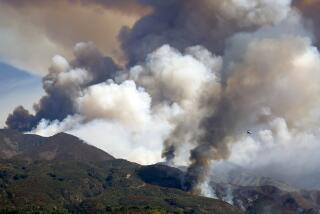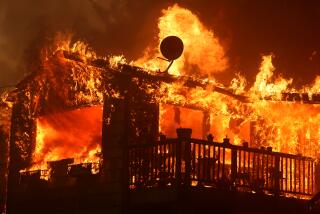Column: California’s deadly wildfires to be major focus of attention as Legislature returns to work
A thin layer of smoke has stretched across Sacramento for the past week, coming from the deadly wildfires burning to the north and east. The smoke serves as a powerful reminder of a topic likely to dominate the work of lawmakers returning to the state Capitol this week.
“We’re in uncharted territory,” Gov. Jerry Brown said last week after a briefing by state emergency officials. “Since civilization emerged 10,000 years ago, we haven’t this kind of heat condition and it’s going to continue getting worse.”
What awaits the Legislature, which adjourns for the year on Aug. 31, is a series of complicated policy choices — none more so than those the role that California utilities play in preventing wildfires and the liability to which they’re exposed when their equipment plays a part in the origins of a blaze. A pending revision of the rules is drawing close scrutiny from utility companies, local governments, the insurance industry and consumer activists.
California lawmakers grapple with how to prevent deadly wildfires and who should pay victims »
Utilities say existing fire liability rules are so costly it could lead to bankruptcy. Big businesses, fearful of the impact on what they pay for electricity, are also in favor of new liability limits. There’s also another controversial plan under discussion: Pacific Gas & Electric Co., facing billions in liabilities from deadly 2017 fires, is pushing for the state to help it borrow money to cover its costs.
Consumer groups fear utilities will pass along fire costs to California families in their monthly power bills. Brown said it’s time to find “a reasonable balance” to a serious problem.
“What is the proper rule of liability? How are we going to allocate these costs?” Brown wondered aloud last week.
The governor also gave voice to a growing concern that the fiscal health of electric utility companies poses a threat to California’s climate change agenda. If they falter or fail, the state could miss its targets for reducing greenhouse gases.
Utilities are at the heart of two other closely watched debates coming in August: an ambitious plan to move California toward 100% clean energy sources and a historic attempt to have the state merge its electric power grid with those of neighboring states.
“The investor-owned utilities are really dealing with some serious issues, and I think we all recognize that,” Assemblyman Chris Holden (D-Pasadena) said during a legislative hearing last month on the renewable energy plan, Senate Bill 100.
Nor will the smoke from the fires make climate change policy any easier. State regulators may be asked to take the blazes into account as they calculate greenhouse gas emissions.
The specter of fire spreads much further over this final month of the legislative session. Republicans hope there will be momentum for changing the rules that they say have kept California’s forests from being properly thinned — either by natural fires or by timber harvesting — and thus become explosive disasters in waiting.
“We put ourselves in this position,” Assembly GOP Leader Brian Dahle (R-Bieber) said during a hearing last month. “We’ve had a hundred years, almost a hundred years of fire suppression in California.”
Lawmakers could easily introduce other proposals this month inspired by the fires to address the challenges of fewer new homeowner insurance policies being written and regarding recovery efforts in individual communities from Lake County in the north to Idyllwild in Riverside County. And that’s to say nothing of the tax dollars being spent on the blazes by state firefighters, some $773 million in the most recent fiscal year.
Four weeks isn’t much time for the Legislature to tackle these issues, and there’s a real danger in rushing to pass proposals that aren’t fully vetted. Then again, it’s the crisis burning through neighborhoods across California that some say is proof that there’s no time to wait.
Follow @johnmyers on Twitter, sign up for our daily Essential Politics newsletter and listen to the weekly California Politics Podcast.
More to Read
Get the L.A. Times Politics newsletter
Deeply reported insights into legislation, politics and policy from Sacramento, Washington and beyond. In your inbox three times per week.
You may occasionally receive promotional content from the Los Angeles Times.











